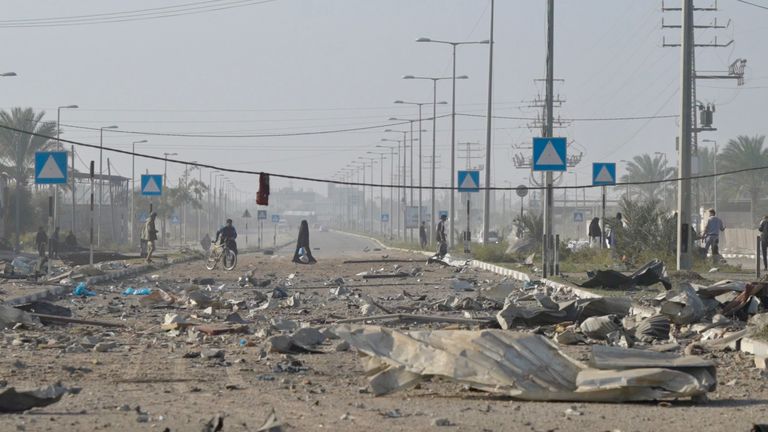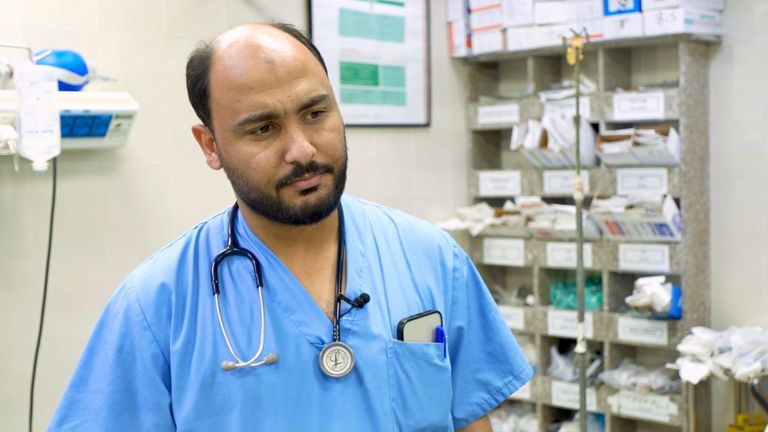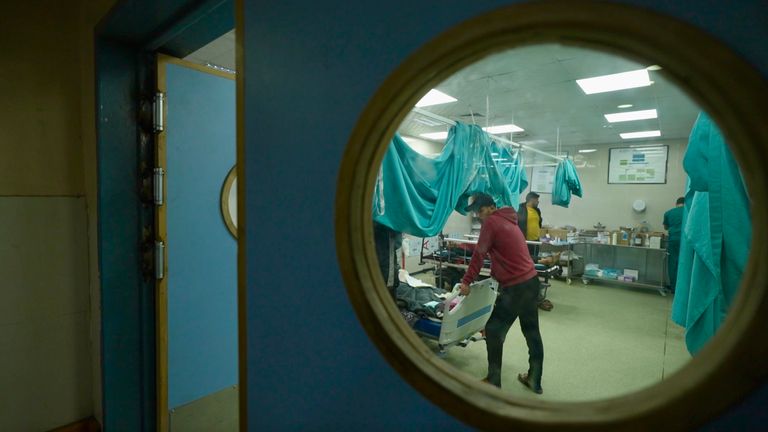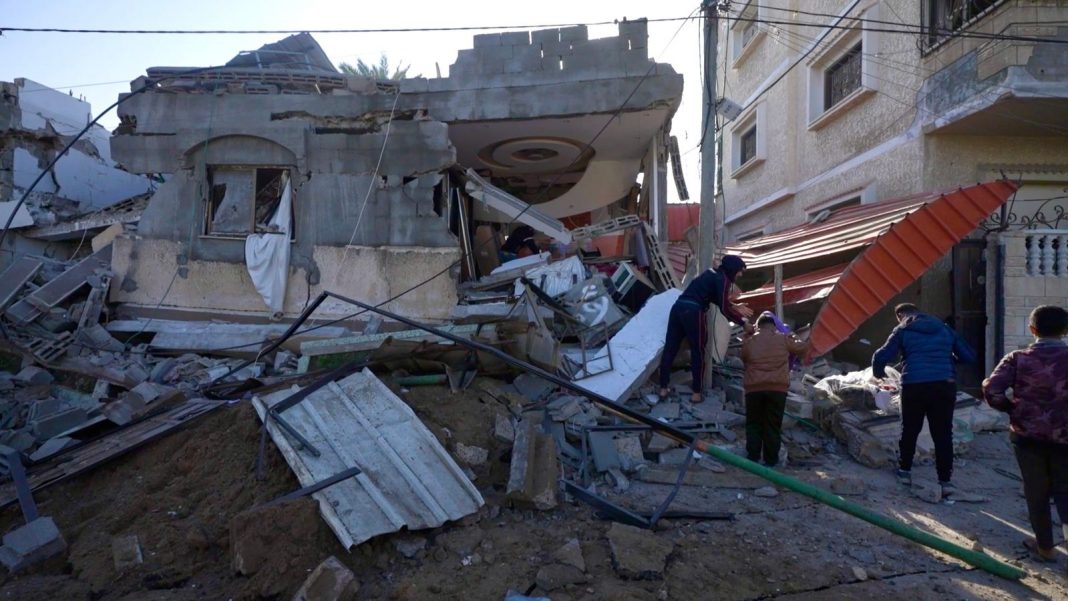Israel’s determination to completely dismantle Hamas means that takeover of the south is an absolute military necessity.
The southern campaign has already started, with air raids in and around the city of Khan Younis fully underway.
The problem is that, to all intents and purposes, most of the surviving Gazan population is now crowded into the south already.
Many had moved south from towns or cities like Gaza City, and have been told by Israeli defence forces they need to move again, further south, to the Rafah Crossing area that borders Egypt, or to the barren coastal strip of al Mawasi.
A family evacuating from Gaza
Under the Israeli plan to ensure people move as safely as possible, they have divided Gaza into numbered blocks, and people living there, in theory, will be told when to move before bombings begin.
How long they will have to comply is unknown.
Leaflets have been dropped with a QR code linked to an interactive map with the numbered districts marked on it.
By any metric, to assume people now displaced, living rough, scared and disorientated, and unlikely to have internet when they don’t have food or water, could navigate the map would seem a bit of a stretch.
Sky News teams in Gaza met Muhamed Rayis holding the leaflet with the QR code on it. He says he followed the instructions, moved to a safe area, and then got bombed.
“Look at this is the leaflet. How can you bomb civilians in their homes? You’re telling people that Wadi Alsalga is safe, how come then you bomb there, at least warn us before you bomb us, they have bombed 3 or 4 houses, they’ve displaced people, why?”

Gaza resident Mohamed Rayis seen with a leaflet marked with a QR code linking to an interactive map
‘We do not know where to go’
“We do not know where to go, because they have told us the central area is safe, and we came here and now they started to bomb us here too, so we do not know where to go. This is their leaflet!” he shouted.
What we have seen from our daily feed of pictures from our teams inside Gaza illustrates just how difficult and dangerous living in the south has become – and how difficult it will be for the IDF to complete its operation without killing further large numbers of civilians.
In a smoky haze in Khan Younis, our teams filmed as people tried to move during a break in the aerial bombardment.
They pick their way through what is now a battlefield from the north to the south of the Strip.

Residents walking through war-torn Gaza
Donkey-drawn carts navigate their way around rubble and battle-scarred roads, while a steady stream of people move on foot. But there is little sanctuary to be found in Gaza.
Another set of pictures, scenes that have become all too familiar, show people heading into the rubble searching for the living and the dead.
It’s a constant, just like the airstrikes.
At the Nasser Medical Complex, a survivor dazed and covered in dust makes his way inside.
This man and a little boy alongside are told to sit on the floor in one ward, before being treated for their wounds.

An injured man and child at Nasser Medical Complex
They’re among the luckiest of the injured as their injuries aren’t severe, but their faces are a picture of pure trauma and shock, and that doesn’t just go away.
The more seriously injured are rushed through the crowds, bundled into cars, and taken to the emergency room.
The hospitals that are still functioning in Gaza can barely cope, while the numbers of dead rise every day.
Please use Chrome browser for a more accessible video player

4:32
‘Death toll may reach 75,000’
Situation is ‘catastrophically bad’
The Hamas-controlled health ministry says 70% of fatalities are women and children.
Doctor Nuradin Khatib is a junior doctor at the Nasser Hospital and he says it is a disaster.

Doctor Nuradin Khatib tells Sky News the situation is ‘catastrophically bad’

Patients inside Nasser Medical Complex in Gaza
“The pressure on the hospital with the number of patients and injuries has doubled,” he said.
“The situation is catastrophically bad, there are no beds for the patients, we have to treat the patients on the hospital floor as there are no beds to put them on, people are short of everything.”
“In all honesty the situation is extremely bad, the huge number of the injured as well the other patients who have long-term illnesses in all departments, it is beyond our power,” he added.
Read more:
What will Israel do now the truce has ended?
UK surveillance flights over Israel and Gaza to help find hostages
Israel ‘knew about Hamas attack plans a year before it happened’
Please use Chrome browser for a more accessible video player

0:23
Israeli airstrikes resume in southern Gaza
Aid supplies were initially stopped after the ceasefire ended but appear to have resumed as some aid has entered Gaza -though it’s a trickle, and nowhere near enough.
The IDF’s operations continue in the north and are developing in the south, and their campaign to oust Hamas continues.
The biggest concern though for the international community is what happens to all the civilians who are not sure where to go to find safety.
Many people in and around Khan Younis in the south have come from the north, and are having to move yet again.
In reality though, there’s not much further south they can go.
This content is provided by Spreaker, which may be using cookies and other technologies.
To show you this content, we need your permission to use cookies.
You can use the buttons below to amend your preferences to enable Spreaker cookies or to allow those cookies just once.
You can change your settings at any time via the Privacy Options.
Unfortunately we have been unable to verify if you have consented to Spreaker cookies.
To view this content you can use the button below to allow Spreaker cookies for this session only.
Click to subscribe to the Sky News Daily wherever you get your podcasts







